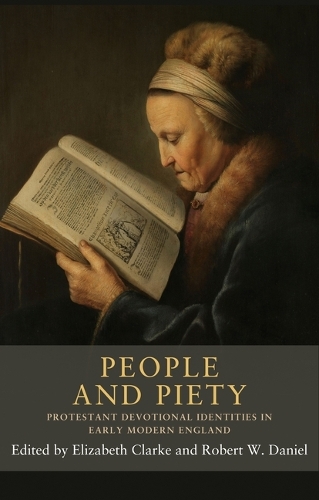
People and Piety: Protestant Devotional Identities in Early Modern England
(Paperback)
Available Formats
Publishing Details
People and Piety: Protestant Devotional Identities in Early Modern England
By (Author) Elizabeth Clarke
Edited by Robert W. Daniel
Manchester University Press
Manchester University Press
1st February 2025
United Kingdom
Classifications
General
Non Fiction
Religion and beliefs
History and Archaeology
820.9382
Physical Properties
Paperback
320
Width 140mm, Height 216mm, Spine 17mm
373g
Description
This international and interdisciplinary volume investigates Protestant devotional identities in sixteenth- and seventeenth-century England. Divided into two sections, the book examines the 'sites' where these identities were forged the academy, printing house, household, theatre and prison and the 'types' of texts that expressed them spiritual autobiographies, religious poetry and writings tied to the ars moriendi providing a broad analysis of social, material and literary forms of devotion during England's Long Reformation. Through archival and cutting-edge research, a detailed picture of 'lived religion' emerges, which re-evaluates the pietistic acts and attitudes of well-known and recently discovered figures. To those studying and teaching religion and identity in early modern England, and anyone interested in the history of religious self-expression, these chapters offer a rich and rewarding read.
Reviews
'Situating itself broadly within the well-established field of "self fashioning" studies, but more particularly within the more recent "devotional turn" in historiography, this is a well-chosen, carefully structured... effective and handsomely produced volume... well-thought-out and stimulating... Much new research is to be found here.' Literature & History, R. C. Richardson
'...all of the fine essays in this volume reflect the considerable time given by the contributors to the "otherness" of their subjects and, as a result, offer the reader fascinating insights into the variety of devotional identities in early modern England.'
Baptist Quarterly, Karen E. Smith
''This fine new volume... is predicated on the principle that it is through the detailed study of particular lives that we can come closest to appreciating early modern religion and religious writing. The result is a fascinating collection of new essays... I recommend it wholeheartedly to anyone interested in the history, literature or religion of early modern England, and especially in the meeting of these elements in the endlessly fascinating devotional lives of its people.'
Bunyan Studies, Helen Wilcox
'This collection of fourteen essays provides a wealth of examples of the ways that devotional identities were formed and understood in early modern England... Whether a reader approaches the collection as a whole or dips into it according to her interests, she is sure to emerge with a deeper understanding of popular piety in early modern England.'
Milton Quarterly, Brook Conti
'In their important edited collection... Elizabeth Clarke and Robert W. Daniel succeed in their intention of demonstrating that piety did not define people in early modern England, for it was people who defined their piety. Responding to the recent devotional turn, and in particular, renewed calls to consider individuals lived religious practice, Clarke and Daniel bring together wide-ranging and interdisciplinary chapters that survey the breadth and vitality of Protestant devotional identities... This volume serves as a snapshot of the state of a flourishing field, a comprehensive and enlightening overview of the construction of devotional identities, and deserves to be widely consulted as a key survey of English Protestantism.'
Journal of British Studies, Emily Vine
Author Bio
Elizabeth Clarke is Professor Emeritus in English and Comparative Literary Studies at the University of Warwick
Robert W. Daniel is Associate Tutor in English at the University of Warwick.
